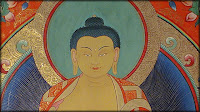
We are born as single, distinct individuals, despite any familial nurturing or support. All things pass away. With age, those of us who survive longest live the loneliest lives. This is nature. Eventually we die our separate deaths. Our bodies simply give out from one cause or another.
Our conscious lives are linear, despite any meditative or holistic practice we adopt along the way. This is an inevitable human condition. We can flee into denial, drug addiction or insanity in attempts to avoid it. But, the heart beats and the lungs bellow their inevitably finite number of mechanical times before they cease, like all engines in a material world.
Should we spend our time unnecessarily preoccupied with living longer and looking perpetually young? What is the use? How does that help the human condition or promote peace for all? When the door closes on each life, it closes as relentlessly as the door of a subway train. Death comes. There's no holding it back indefinitely.
So, given the limits of our human journey, what path should we follow? Should we wallow in hedonistic pleasure? Should we see life as an endless bag of potato chips to be devoured and craved indefinitely? Should we become self-centered and get everything we can for our own pleasure in the short time we have? She would focus on fleeting fame or popularity?
Perhaps we should shed every pleasure in favor of mind expansion and understanding of the human condition. The cloister, the cave, the mountaintop. Austerity in the name of inner peace and liberation.
I believe in the Middle Path. I live immersed in the world, yet not attached to it. I care for my body and mind, but I heed the needs of those around me and respond as best I can. I savor the basic pleasures of home, mobility and social intercourse, but I am prepared at any time to move from my place or my life in the inevitable loneliness of the human condition. I try to take what I need from life. I understand that wanting, when I am full, is a disease. I work to heal that disease in my own life. I try to help others to escape from needless wanting.
This Middle Path is often hard to see in the forest of modern urban life. Deep breathing and patience afford me the time to seek it when I am enveloped in the fog of my own anxiety or the demands of others. Time in meditation and times of being touched by love form the serene pool of happiness and reserve which sustains me when a crisis has passed. All falls into perspective. I know the journey ahead. It is uniquely mine, and I must travel it alone. This is what it is. I am at peace with it and with myself.
























